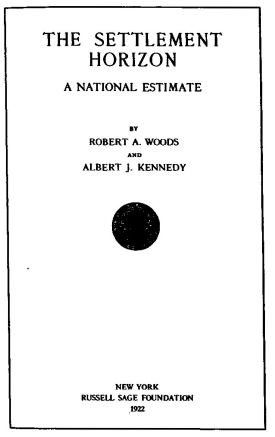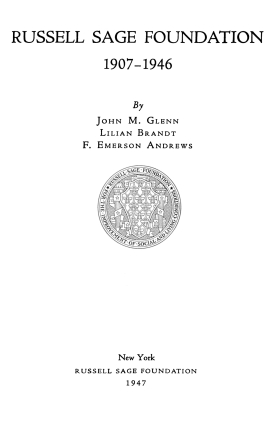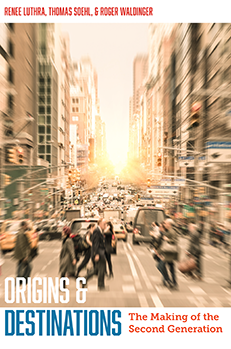About This Book
This pamphlet provides recommendations for safer celebratory traditions for the Fourth of July.
August H. Brunner, Department of Child Hygiene, Russell Sage Foundation
This pamphlet provides recommendations for safer celebratory traditions for the Fourth of July.
August H. Brunner, Department of Child Hygiene, Russell Sage Foundation
Prepared by the Committee on Independence Day Celebrations of the Art Department, New Jersey State Federation of Women’s Clubs. Reprinted by the Department of Child Hygiene, Russell Sage Foundation
From the Preface: “The importance of a ‘safe and sane’ Independence Day needs no argument. The aim of this booklet is to offer to those who are seeking material for such an occasion, gleanings from the experience of others who have achieved success in this direction, and to assist any who desire to arrange suitable pageantry in finding amid the treasures of New Jersey history scenes appropriate for representation.”

An exploration of settlements throughout the United States, in particular non-residential neighborhood centers, covering a range of interests, including history, educational approaches, and connections to labor.
ROBERT A. WOODS, New York Charities Publication Committee
ALBERT J. KENNEDY, New York Charities Publication Committee

“The prevailing view holds that union power and unreasonable demands by workers are responsible for the decline of the U.S. auto industry. In this compellingly argued study, Murray and Schwartz challenge that narrative. The problem, Wrecked lucidly argues, is not workers’ actual power. The root of the problem is that U.S. manufacturers are totally unwilling to form a social contract with workers and their unions, choosing total company control despite the fact that means increased costs and decreased flexibility. Anyone interested in reviving U.S. manufacturing needs to read this book.”
—DAN CLAWSON, professor of sociology, University of Massachusetts, Amherst
“It’s almost a truism to lay the decline of the American auto industry at the feet of the trade union movement—for demanding too much, not working hard enough, and in so doing, reducing the competitiveness of the Big Three automakers. But in this brilliant book, Josh Murray and Michael Schwartz place the blame back where it belongs—on the managers and owners and their investment decisions. Whereas Japanese competitor firms based their production model on increasing labor productivity, the Big Three turned increasingly to a low-wage, low-cost model—which quickly lost ground to rival producers. The result has been nothing short of catastrophic for millions of workers in the heartland of American manufacturing. Wrecked sets the record straight. It will take its place as a classic in economic sociology.”
—VIVEK CHIBBER, professor of sociology, New York University
At its peak in the 1950s and 1960s, automobile manufacturing was the largest, most profitable industry in the United States and residents of industry hubs like Detroit and Flint, Michigan had some of the highest incomes in the country. Over the last half-century, the industry has declined, and American automakers now struggle to stay profitable. How did the most prosperous industry in the richest country in the world crash and burn? In Wrecked, sociologists Joshua Murray and Michael Schwartz offer an unprecedented historical sociological analysis of the downfall of the auto industry. Through an in-depth examination of labor relations and the production processes of automakers in the U.S. and Japan both before and after World War II, they demonstrate that the decline of the American manufacturers was the unintended consequence of their attempts to weaken the bargaining power of their unions.
Today Japanese and many European automakers produce higher quality cars at lower cost than their American counterparts thanks to a flexible form of production characterized by long-term sole suppliers, assembly and supply plants located near each other, and just-in-time delivery of raw materials. While this style of production was, in fact, pioneered in the U.S. prior to World War II, in the years after the war, American automakers deliberately dismantled this system. As Murray and Schwartz show, flexible production accelerated innovation but also facilitated workers’ efforts to unionize plants and carry out work stoppages. To reduce the efficacy of strikes and combat the labor militancy that flourished between the Depression and the postwar period, the industry dispersed production across the nation, began maintaining large stockpiles of inventory, and eliminated single sourcing. While this restructuring of production did ultimately reduce workers’ leverage, it also decreased production efficiency and innovation. The U.S. auto industry has struggled ever since to compete with foreign automakers, and formerly thriving motor cities have suffered the consequences of mass deindustrialization.
Murray and Schwartz argue that new business models that reinstate flexible production and prioritize innovation rather than cheap labor could stem the outsourcing of jobs and help revive the auto industry. By clarifying the historical relationships between production processes, organized labor, and industrial innovation, Wrecked provides new insights into the inner workings and decline of the U.S. auto industry.
JOSHUA MURRAY is Assistant Professor of Sociology at Vanderbilt University.
MICHAEL SCHWARTZ is Distinguished Teaching Professor of Sociology at Stony Brook University.

This history covers the first forty years of Russell Sage Foundation's efforts toward "the improvement of social and living conditions in the United States of America." It records the things that were done, both as direct work and through grants, with considerable attention to the social situation which made them seen necessary or desirable. It is of value not only to those interested in the operation of the Russell Sage Foundation or other foundatons, but for the light it throws upon the origins and development of a wide variety of movements in the borad field of social science.

“A vast second generation, more than twenty million strong, is bringing broad, deep, and perplexing transformations to American society, and the pace of change is quickening. Here now we have an essential framework for making sense of it. Building on pillars of the existing literature, the authors take our understanding of the children of immigrants into new dimensions, literally. The analysis examines variation both among national origin groups and among individuals of the same group and does that all while exploring determinants in both countries of origin and at destination. Origins and Destinations is an important step forward for migration scholarship and grounds for much scholarship to come.”
—ROBERTO SURO, professor of journalism and public policy, University of Southern California
“The authors of Origins and Destinations have done immigration scholars a great favor by providing the most comprehensive theoretical account to date of how individual processes of immigrant adaptation and integration are socially structured, not simply by contexts of reception but also by contexts of emigration, and along ideational as well as material dimensions. In so doing, it sheds new light on the remarkable diversity of outcomes exhibited by the children of immigrants in the United States today.”
—DOUGLAS MASSEY, Henry G. Bryant Professor of Sociology and Public Affairs, Woodrow Wilson School, Princeton University
The children of immigrants continue a journey begun by their parents. Born or raised in the United States, this second generation now stands over 20 million strong. In this insightful new book, immigration scholars Renee Luthra, Thomas Soehl, and Roger Waldinger provide a fresh understanding of the making of the second generation, bringing both their origins and destinations into view.
Using surveys of second generation immigrant adults in New York and Los Angeles, Origins and Destinations explains why second generation experiences differ across national origin groups and why immigrant offspring with the same national background often follow different trajectories. Intergroup disparities stem from contexts of both emigration and immigration. Origin countries differ in value orientations: immigrant parents transmit lessons learned in varying contexts of emigration to children raised in the U.S. A system of migration control sifts immigrants by legal status, generating a context of immigration that favors some groups over others. Both contexts matter: schooling is higher among immigrant children from more secular societies (South Korea) than among those from more religious countries (the Philippines). When immigrant groups enter the U.S. migration system through a welcoming door, as opposed to one that makes authorized status difficult to achieve, education propels immigrant children to better jobs.
Diversity is also evident among immigrant offspring whose parents stem from the same place. Immigrant children grow up with homeland connections, which can both hurt and harm: immigrant offspring get less schooling when a parent lives abroad, but more schooling if parents in the U.S. send money to relatives living abroad. Though all immigrants enter the U.S. as non-citizens, some instantly enjoy legal status, while others spend years in the shadows. Children born abroad but raised in the U.S. are all everyday Americans, but only some have become de jure Americans, a difference yielding across-the-board positive effects, even among those who started out in the same country.
Disentangling the sources of diversity among today’s population of immigrant offspring, Origins and Destinations provides a compelling new framework for understanding the second generation that is transforming America.
RENEE LUTHRA is senior lecturer in sociology at the University of Essex.
THOMAS SOEHL is assistant professor of sociology at McGill University and the Canada Research Chair in International Migration.
ROGER WALDINGER is Distinguished Professor of Sociology at the University of California, Los Angeles.